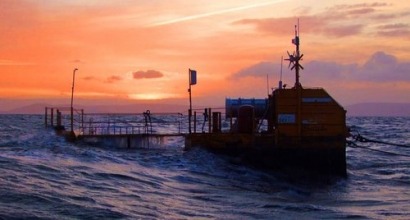
Led by researchers at the Hydraulics and Maritime Research Centre (HMRC) at University College Cork in Ireland, the project, funded as part of the 'Infrastructures' Theme of the EU's Seventh Framework Programme (FP7), will allow companies to carry out renewable energy testing at these centres at no extra cost.
Participating countries include Belgium, Brazil, Denmark, Germany, Italy, Ireland, the Netherlands, Norway, Portugal, Spain, and the United Kingdom.
The MARINET project, which launches its call for proposals this month and will run until 2015, will help remove some of the financial barriers that sometimes stand in the way of access to world-class European testing facilities.
Under MARINET, companies and research groups will have access to facilities outside their own country. Testing will focus on checking concepts and devices in areas such as wave energy, tidal energy, offshore-wind energy and the environment. It is hoped that this project will play a part in accelerating widespread development of marine renewable energy.
The initiative, with at least four calls for applications, runs until 2015 and the first call for applications opened on 1 December.
Potential users, who must work in Europe or a country associated to the European FP7 programme, are invited to apply to access this first call.
“MARINET offers a unique opportunity to access these world-class European test facilities in order to validate and progress concepts at any stage of development, and to ultimately harness the untapped renewable energy resources that are abundant around the European coastline,” said Tony Lewis, a professor at HMRC. “This is a great opportunity to advance marine renewable research testing and commercial development.”
Offshore renewable conversion systems are mostly at the pre-commercial stage of development. They comprise wave energy and tidal stream converters as well as offshore wind turbines for electrical generation. These devices require research to be undertaken at a series of scales along the path to commercialisation.
Each technology type is currently at a different stage of development, but each one also needs specific research infrastructures to facilitate and catalyse commercialisation.
The MARINET network is made up of 42 testing facilities at 28 research centres in 11 European countries as well as in Brazil.
The aim of this project is to coordinate research and development at all scales (from small models through to prototype scales, from laboratory through to open sea tests), and to allow access for researchers and developers to facilities that are not universally available in Europe.
Interested groups should complete the online application form on www.fp7-marinet.eu. The closing date for applications is 29 February 2012.
For additional information:

